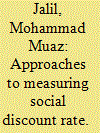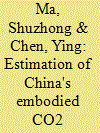| Srl | Item |
| 1 |
ID:
120157


|
|
|
| 2 |
ID:
192506


|
|
|
|
|
| Summary/Abstract |
This paper analyzes trends and factors of Chinese economic growth in recent years (2017-2022). It pays particular attention to the role of foreign trade and cross-border capital movement in China's economic development, as well as to the status of its debt position. It also draws a number of conclusions about prospects for the growth and evolution of China's economic development model.
|
|
|
|
|
|
|
|
|
|
|
|
|
|
|
|
| 3 |
ID:
108395


|
|
|
|
|
| Publication |
2011.
|
| Summary/Abstract |
The problem of CO2 embodied in international trade has attracted increasing attention in China. To analyze this issue, the present paper directly calculates emission factors for 15 industries in 2002, 2005 and 2007. We then examine a consumption-based system and a single-region input-output model to estimate China's embodied emissions during 2000-2009. Our results show that, when a consumption-based system is adopted, China's emissions are lower than those reported by some international organizations. The rapid growth in China's exports is a key determinant of China's rising total emissions. All countries should strengthen their cooperation in improving their current greenhouse gas inventories. Furthermore, China needs to encourage trade in low-carbon products and technology.
|
|
|
|
|
|
|
|
|
|
|
|
|
|
|
|
| 4 |
ID:
167814


|
|
|
|
|
| Summary/Abstract |
This paper evaluates the effects of the Home Appliances Going to the Countryside (HAGC) policy, a fiscal subsidy program implemented in China to boost private consumption of home appliances in rural areas from 2007 to 2012. Using the policy as a natural experiment and employing the difference‐in‐difference estimator, we find that the policy did not increase domestic sales of relevant goods as expected; instead, it actually reduced domestic sales and significantly promoted exports. These surprising results are robust across regressions of alternative datasets, more controls, and different regions. We further provide detailed information of undisclosed audit data for a county in Zhejiang province to shed light on the underlying mechanism of such unexpected results, suggesting loopholes in the HAGC and changes in export tax rebate rates.
|
|
|
|
|
|
|
|
|
|
|
|
|
|
|
|
| 5 |
ID:
118689


|
|
|
|
|
| Publication |
2013.
|
| Summary/Abstract |
This article examines the relationships between administrators and the administered within the framework of local development brokerage practices directed at setting up running water systems for domestic consumption in Tibetan rural areas of Qinghai Province. Split between several locations, the activities of the brokers entail finding agreements and compromises in various forms with a variety of interlocutors: local government, the recipients of the project - and also the deities.
|
|
|
|
|
|
|
|
|
|
|
|
|
|
|
|